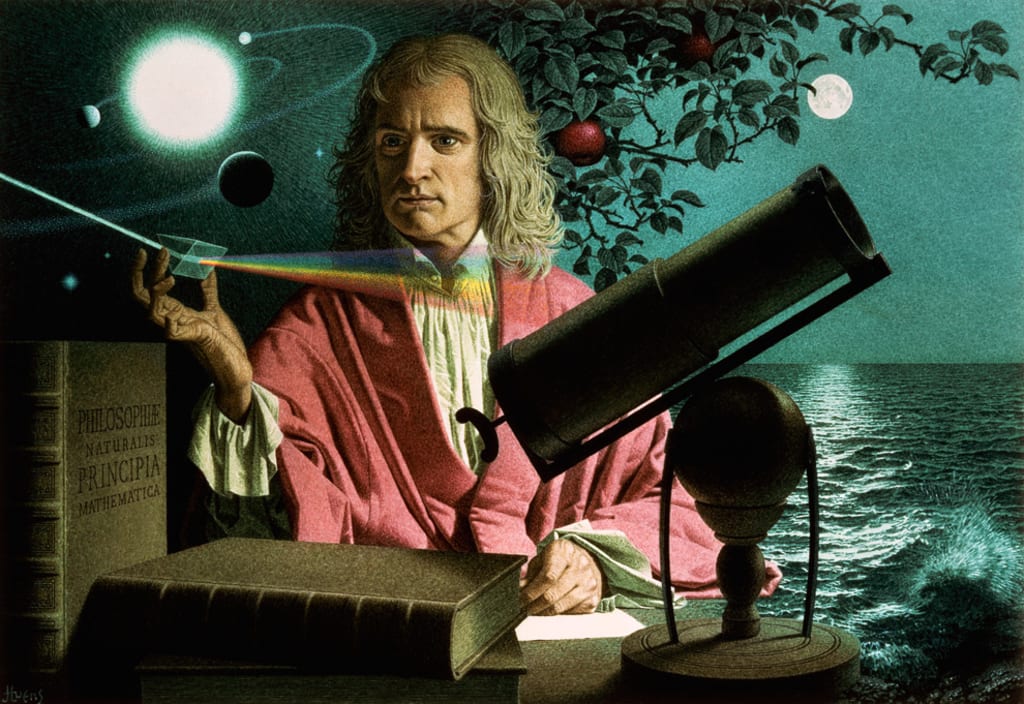Secrets of Isaac Newton

He disappointed his mother by not pursuing her dream of becoming a farmer. His relationships with others were so complex that he ended up living a solitary life. However, his passion for alchemy led him to become one of the most renowned scientists in history. Yes, I'm referring to Isaac Newton, the famous English physicist and mathematician who revolutionized modern physics. Newton was born in the small village of Wol Thorp in 1643. Unfortunately, he never had the chance to meet his father, who passed away before his birth. Around the same time, another brilliant scientist, Galileo Galilei, took his last breath in Florence. Little did Newton know that he would later build upon Galileo's ideas and make them legendary. From the very beginning, Isaac faced challenges as he was born prematurely and had to fight for survival. He was so tiny that he could fit inside a large mug. His mother remarried shortly after his birth, and he ended up living with his grandmother, separated from his mother for nine years. This solitude had a lasting impact on his life. Years later, when reflecting on his past, he even confessed to having fiery thoughts about his stepfather, such as wanting to burn down the house. On the bright side, his isolation sparked his interest in books on mechanics and technology. He even developed a highly accurate system of sundials. Recognizing his intellectual potential, his uncle and school headmaster encouraged him to pursue his studies instead of tending to the family property. Despite his mother's initial resistance, she eventually gave in, and Newton returned to grammar school. At the age of 18, he was admitted to Trinity College, Cambridge. To support his education, Newton worked and studied, waiting tables and taking care of other students' rooms.
During his time at Trinity College, Newton immersed himself in his studies, particularly in mathematics and physics. He devoured books on these subjects and quickly became known for his exceptional intellect and problem-solving abilities. It was during this time that he began to develop his groundbreaking theories and ideas.
One of Newton's most significant contributions to science was his theory of universal gravitation. Inspired by an apple falling from a tree, Newton realized that the same force that caused the apple to fall also governed the motion of the planets and other celestial bodies. This realization led him to formulate the laws of motion, which laid the foundation for classical mechanics.
Newton's work on optics was equally groundbreaking. He conducted experiments with prisms and discovered that white light is composed of a spectrum of colors. He also developed the first reflecting telescope, which allowed for clearer and more detailed observations of the night sky.
Despite his immense success in the scientific community, Newton's personal life remained complicated. He was known for his intense and sometimes volatile personality, often engaging in bitter disputes with fellow scientists and scholars. His relationships with others were strained, and he preferred to spend his time in solitude, focusing on his work.
In 1687, Newton published his most famous work, "Mathematical Principles of Natural Philosophy," commonly known as the "Principia." This monumental book laid out his laws of motion and universal gravitation, providing a comprehensive explanation of the physical world. The "Principia" revolutionized the field of physics and solidified Newton's status as one of the greatest scientists in history.
Newton's contributions to science and mathematics were recognized and celebrated during his lifetime. He was knighted by Queen Anne in 1705 and became the president of the Royal Society, the leading scientific organization in England. His work continues to be studied and revered to this day, with his laws of motion and universal gravitation forming the basis of modern physics.
Isaac Newton's journey from a solitary life in a small village to becoming a renowned scientist is a testament to the power of passion and determination. Despite disappointing his mother by not pursuing her dream of farming, Newton's pursuit of knowledge and his unwavering dedication to his studies led him to make groundbreaking discoveries that forever changed our understanding of the physical world.
is theories and principles forming the basis of modern physics and mathematics. Newton's legacy as a scientific genius and his impact on the world of science cannot be overstated. His discoveries and theories have shaped our understanding of the physical world and have paved the way for countless advancements in various fields of science.
Newton's work on universal gravitation and the laws of motion laid the foundation for classical mechanics, which is still widely used today. His theory of universal gravitation explained the force that governs the motion of celestial bodies, providing a unified understanding of the physical world. This theory not only explained the motion of planets and other celestial bodies but also allowed for the prediction of future astronomical events.
In addition to his work on mechanics, Newton's contributions to optics were equally significant. His experiments with prisms and his discovery of the spectrum of colors in white light revolutionized our understanding of light and laid the groundwork for the field of optics. His development of the reflecting telescope allowed for more detailed observations of the night sky, leading to further discoveries and advancements in astronomy.
Newton's impact extended beyond the realm of science. His work on calculus, which he developed independently of other mathematicians, revolutionized mathematics and provided a powerful tool for solving complex problems. His mathematical principles and methods are still widely used today and form the basis of many mathematical and scientific disciplines.
Despite his immense contributions to science and mathematics, Newton's personal life was marked by challenges and complexities. His intense and volatile personality often led to conflicts and disputes with his peers. He was known for his stubbornness and his unwillingness to accept criticism or alternative viewpoints. His relationships with others were strained, and he preferred to spend his time in solitude, focusing on his work.
Nevertheless, Newton's brilliance and dedication to his studies propelled him to great heights in the scientific community. His work was recognized and celebrated during his lifetime, and he received numerous honors and accolades for his contributions. His knighthood and presidency of the Royal Society were testament to his status as one of the greatest scientists of his time.
Newton's legacy continues to be celebrated and studied to this day. His theories and principles are still taught in classrooms around the world, and his work continues to inspire new generations of scientists and mathematicians. Newton's impact on the world of science and his contributions to our understanding of the physical world are truly remarkable, solidifying his place as one of the greatest scientific minds in history.
About the Creator
Angelo Valentino Krause
A story teller & Photographer that wants to make a differance in the world.






Comments (1)
This writing was outstanding. I liked it a lot and couldn't find any flaws.well-written and informative. You're welcome! on vocal May you have a day full of smiles, always! .